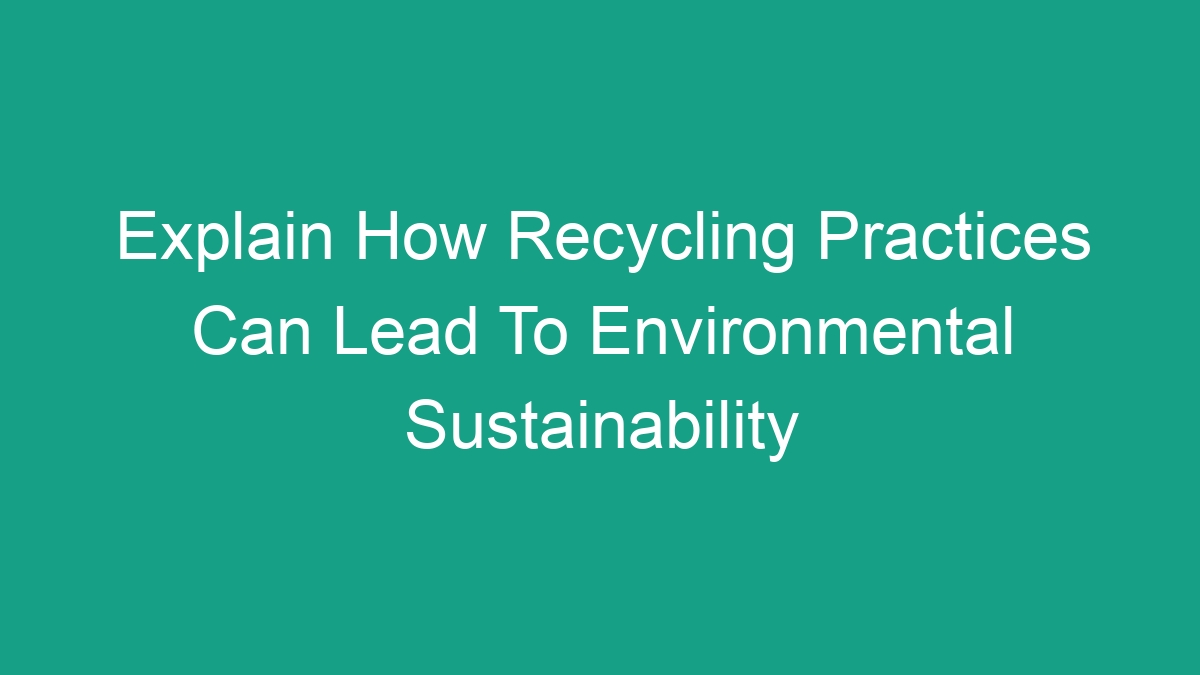
The Importance of Recycling
Recycling is an essential practice that plays a crucial role in environmental sustainability. It involves the process of converting waste materials into reusable products to prevent waste accumulation and reduce the consumption of new raw materials. Recycling not only conserves natural resources but also helps in reducing pollution, lowering energy consumption, and decreasing greenhouse gas emissions. In this article, we will delve into how recycling practices can lead to environmental sustainability and the significant impact it has on the planet.
Reducing Waste
One of the key components of recycling is the reduction of waste that ends up in landfills. Landfills are not only unsightly but contribute to environmental degradation. When waste materials are recycled, they are diverted from landfills, which helps in reducing the strain on these already overcrowded areas. By minimizing the amount of waste that goes to landfills, recycling helps in preserving natural habitats, reducing air and water pollution, and preventing the release of harmful toxins into the environment.
Conservation of Natural Resources
Recycling aids in the conservation of natural resources such as trees, water, and minerals. For example, when paper is recycled, it reduces the need to cut down more trees, which contributes to the preservation of forests and woodland areas. Additionally, the recycling of metals like aluminum and steel saves energy and helps in preserving valuable mineral resources. By reusing materials, recycling lessens the demand for new resources, thereby promoting sustainability and the protection of the Earth’s natural ecosystems.
Energy Conservation
Recycling often requires less energy than producing new products from raw materials. For instance, recycling aluminum saves around 95% of the energy needed to produce new aluminum from bauxite ore. Similarly, recycling paper saves about 60% of the energy required to make paper from virgin wood pulp. By utilizing recycled materials, less energy is consumed in the manufacturing process, resulting in a decrease in greenhouse gas emissions and a more sustainable energy footprint.
Reduction of Greenhouse Gas Emissions
Recycling significantly contributes to the reduction of greenhouse gas emissions. When materials are recycled instead of being incinerated or sent to landfills, the amount of greenhouse gases released into the atmosphere is substantially decreased. For example, recycling plastics reduces the amount of carbon emissions generated during the production process. By lowering greenhouse gas emissions, recycling helps in mitigating climate change and its adverse effects on the environment.
Job Creation and Economic Benefits
Recycling also plays a crucial role in creating job opportunities and contributing to the economy. The recycling industry provides employment for numerous individuals in areas such as collection, processing, and manufacturing. Moreover, the recycling market generates revenue and contributes to the overall economic growth. By promoting recycling practices, communities can benefit from a more sustainable economy while simultaneously reducing their impact on the environment.
Public Awareness and Education
Efforts to promote recycling practices also lead to an increase in public awareness and education about environmental sustainability. Through various educational programs and initiatives, communities are made aware of the importance of recycling and its positive impact on the environment. This heightened awareness fosters a sense of responsibility and encourages individuals to adopt sustainable behaviors in their daily lives, such as reducing, reusing, and recycling materials for the long-term benefit of the planet.
Challenges and Solutions
While recycling has numerous benefits, it is not without its challenges. One of the primary challenges is the contamination of recyclable materials, which can hinder the recycling process and reduce its overall effectiveness. To address this issue, it is essential to educate the public about proper recycling practices and the importance of sorting materials correctly. Additionally, investing in advanced recycling technologies and infrastructure can enhance the efficiency of recycling processes and improve overall sustainability efforts.
Global Impact and Sustainable Development Goals
Recycling practices have a profound global impact and play a vital role in achieving sustainable development goals. By promoting recycling on a global scale, countries can work towards reducing waste, conserving resources, and combatting climate change. The United Nations Sustainable Development Goals (SDGs) specifically target the promotion of responsible consumption and production, which aligns with the principles of recycling and environmental sustainability. By incorporating recycling practices into national and international policies, the global community can work towards a more sustainable and environmentally conscious future.
Conclusion
In conclusion, recycling is an essential practice that can lead to environmental sustainability in numerous ways. From reducing waste and conserving natural resources to lowering energy consumption and greenhouse gas emissions, recycling plays a critical role in protecting the planet and promoting a more sustainable future. By emphasizing the importance of recycling, increasing public awareness, and addressing the challenges associated with recycling, we can work towards building a more environmentally conscious society and a healthier planet for generations to come.



